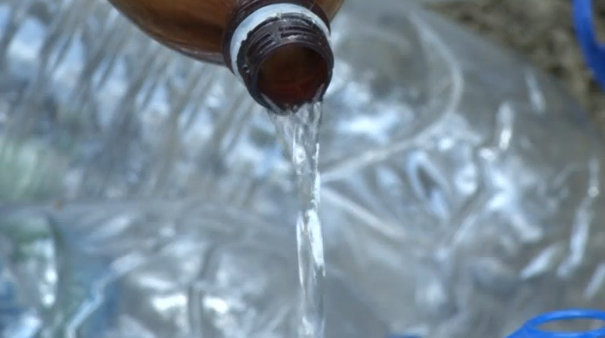
CARACAS, Venezuela (Reuters) — Tensions are mounting in Venezuela over water shortages the ruling socialist government has attributed to natural phenomena, whilst the opposition says infrastructure neglect is to blame.
The country has been struggling with water rationing since the start of the year, fueling public anger already simmering over a worsening recession, soaring inflation and widespread shortages of medicines and basic goods.
Lines of people queuing to buy even toilet paper has become a common sight outside supermarkets and now the lines are stacking up in the streets as people wait, containers in hand, for water.
One of those spending hours in line was Maria Rodriguez in Caracas, who says the government has not done enough to stem the problem.
“It is clear that they did not make the changes when they needed to be made, and now there is a water shortage. The drought is really bad. It is clear that they didn’t do the works that were needed to be done and now we don’t have water at home. And here I am, since 8 a.m., and look what time it is now (noon), just to fill up a container of water,” said Rodriguez.
Anger over water shortages has mounted into protests involving people of all ages demanding basic services.
“It’s the people who are suffering here; our children, the elderly, disabled people, a woman who had a heart attack. I have otitis because of the green water I have to use. And nobody is doing anything about it, nobody offers protection, nobody pays,” said protester, Isamar Suarez.
Water supply has become an ever more pressing issue over recent years as the population grows, and rains have diminished by 45 percent since 2013, according to government figures.
The government has attributed the issue to the El Nino phenomenon, which causes erratic weather conditions, and has been described this year as the worst in 15 years by the World Meteorological Organisation (WMO).
The opposition, which gained a majority in the parliament last December for the first time in 17 years, accepts that natural phenomena are at play, but says it is not a sufficient excuse.
“It could be, as we have shown to the water authorities, that part of the cause is natural phenomena. A lot of people here have mentioned the El Nino phenomenon, but El Nino is nothing new, it is practically an adult at this point. And they have not taken the previsions, the measures that they should have taken when they were due. So what I mean to say is that this sad situation isn’t just due to natural phenomena, but is due to inefficiency and a lack of opportune investment,” said opposition politician and president of a parliamentary commission on the environment, Julio Reyes.
Huge investments in water structure were approved by the former socialist-led parliament, leading Reyes to question why nothing has been done.
“In order to improve (water) services, the quality, of rural aqueducts, of urban aqueducts, the law approved more than 500 million dollars over five years. Our question then is, with these 500 million dollars, which is a large amount, why do states still have problems with water treatment plants. Why are there supply problems due to piping capacity and broken pipes,” said Reyes.
Away from parliament, families and individuals say they are simply concerned about how to get through the day to day, with the shortages having affected poor areas above all.
People are storing any water they can get their hands on in containers at home, in a practice which has previously been blamed for encouraging the proliferation of the mosquito carrying dengue fever and the Zika virus spreading across the Americas.
According to Caracas resident, Carmen Alvarez, living has been compromised down to the most basic of needs.
“When the water arrives, we go crazy filling all the little containers because if we don’t, how will we cook, how will we wash, how will we brush our teeth, all the human necessities, hygiene,” said Alvarez.
“It is chaotic, we have gone four days without water. And you can’t have a water tank in these apartments here because there isn’t enough space,” Alvarez added.
Around the city, it has become common sight to see people lining up to fill containers of all shapes and sizes with water to bring back to their homes.








